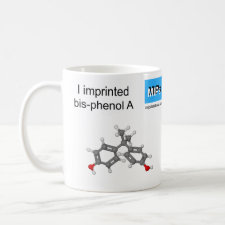
Authors: Sun XL, Wang JC, Li Y, Jin J, Zhang BQ, Shah SM, Wang XL, Chen JP
Article Title: Highly selective dummy molecularly imprinted polymer as a solid-phase extraction sorbent for five bisphenols in tap and river water.
Publication date: 2014
Journal: Journal of Chromatography A
Volume: 1343
Page numbers: 33-41.
DOI: 10.1016/j.chroma.2014.03.063
Alternative URL: http://www.sciencedirect.com/science/article/pii/S0021967314004981
Abstract: A simple and fast method for both dummy template selection and polymer composition optimization is proposed here. A series of dummy templates for bisphenols imprinting were screened by running them on a non-imprinted polymer (NIP) column with porogen solvent as mobile phase. The tested dummy templates mainly involved bisphenol S (BPS), bromobisphenol A (TBBPA), bisphenol F (BPF), bisphenol E (BPE), bisphenol B (BPB), bisphenol AF (BPAF), 2,2',6,6'-tetramethyl-4,4'-sulfonyldiphenol (BS-TM) and 4,4'-diaminodiphenylmethane (DADPM). Different monomers and porogens were also investigated for BPS and DADPM using the same method. BPS dummy template was finally selected with acetonitrile and 4-VP as porogen and monomer. The resulting dummy molecularly imprinted polymer (DMIP) achieved superior affinities for BPF, BPE, BPA, BPB and BPAF with imprinting factors 14.5, 13.8, 8.7, 5.7 and 4.2, respectively. An efficient method based on BPS-DMIP-SPE coupled with HPLC-UV was developed for selective extraction of BPF, BPE, BPA, BPB and BPAF in water samples. The method showed excellent recoveries (89.4-102.0%) and precision (RSD 0.3-4.8%, n = 5) for tap and river water samples spiked at three concentration levels each (40, 200 and 1000 ng L-1). The detection limits ranged between 2.2 and 3.8 ng L-1 with a sample volume of 500 mL. The result demonstrated the superiority of the optimized method for selective extraction of BPs in water samples at the ng L-1 level
Template and target information: dummy template, bisphenol S, BPS, bisphenol F, BPF, bisphenol E, BPE, bisphenol A, BPA, bisphenol B, BPB, bisphenol AF, BPAF
Author keywords: Molecularly imprinted polymers, dummy template, Class-selective, Solid-phase extraction, Bisphenols



Join the Society for Molecular Imprinting

New items RSS feed
Sign-up for e-mail updates:
Choose between receiving an occasional newsletter or more frequent e-mail alerts.
Click here to go to the sign-up page.
Is your name elemental or peptidic? Enter your name and find out by clicking either of the buttons below!
Other products you may like:
 MIPdatabase
MIPdatabase









